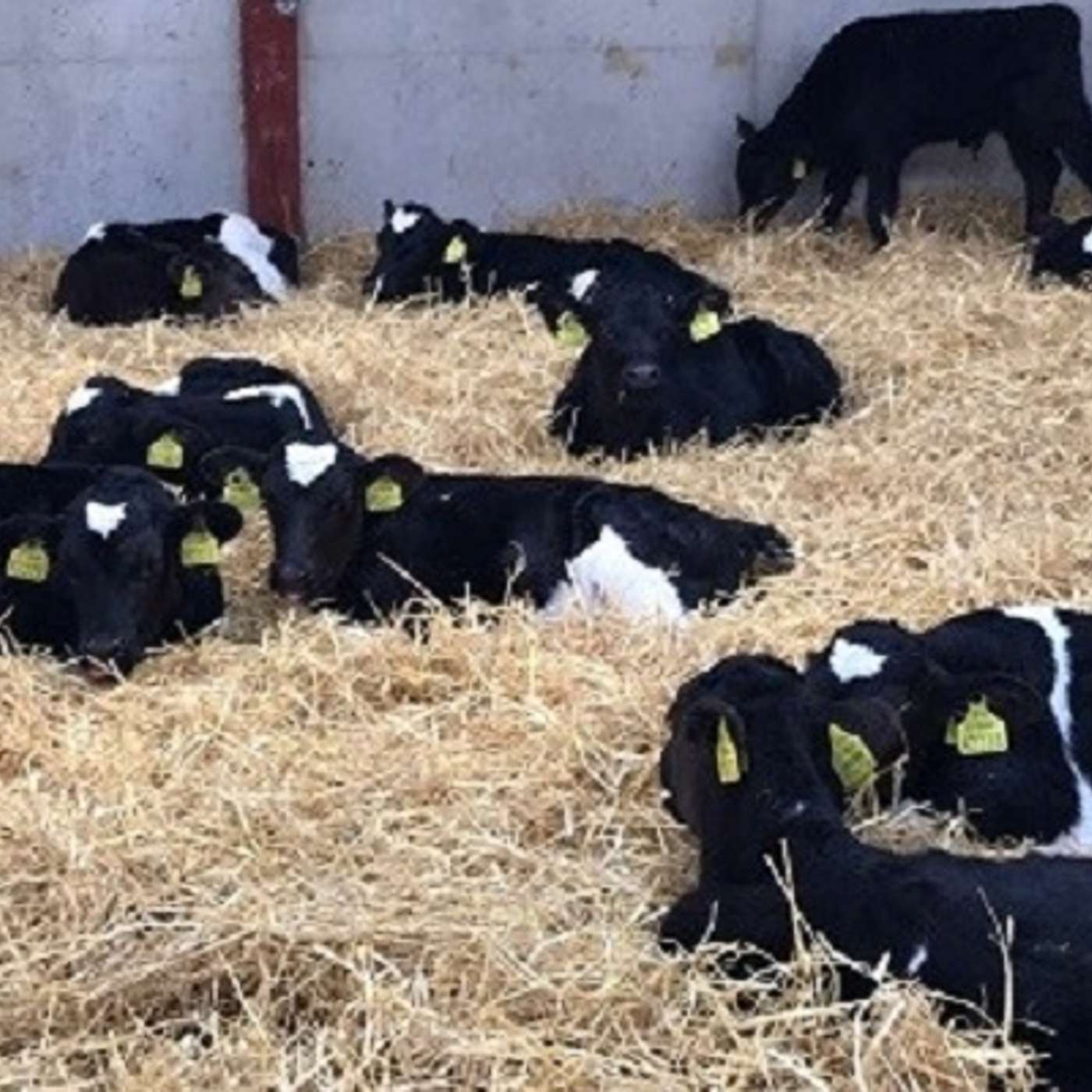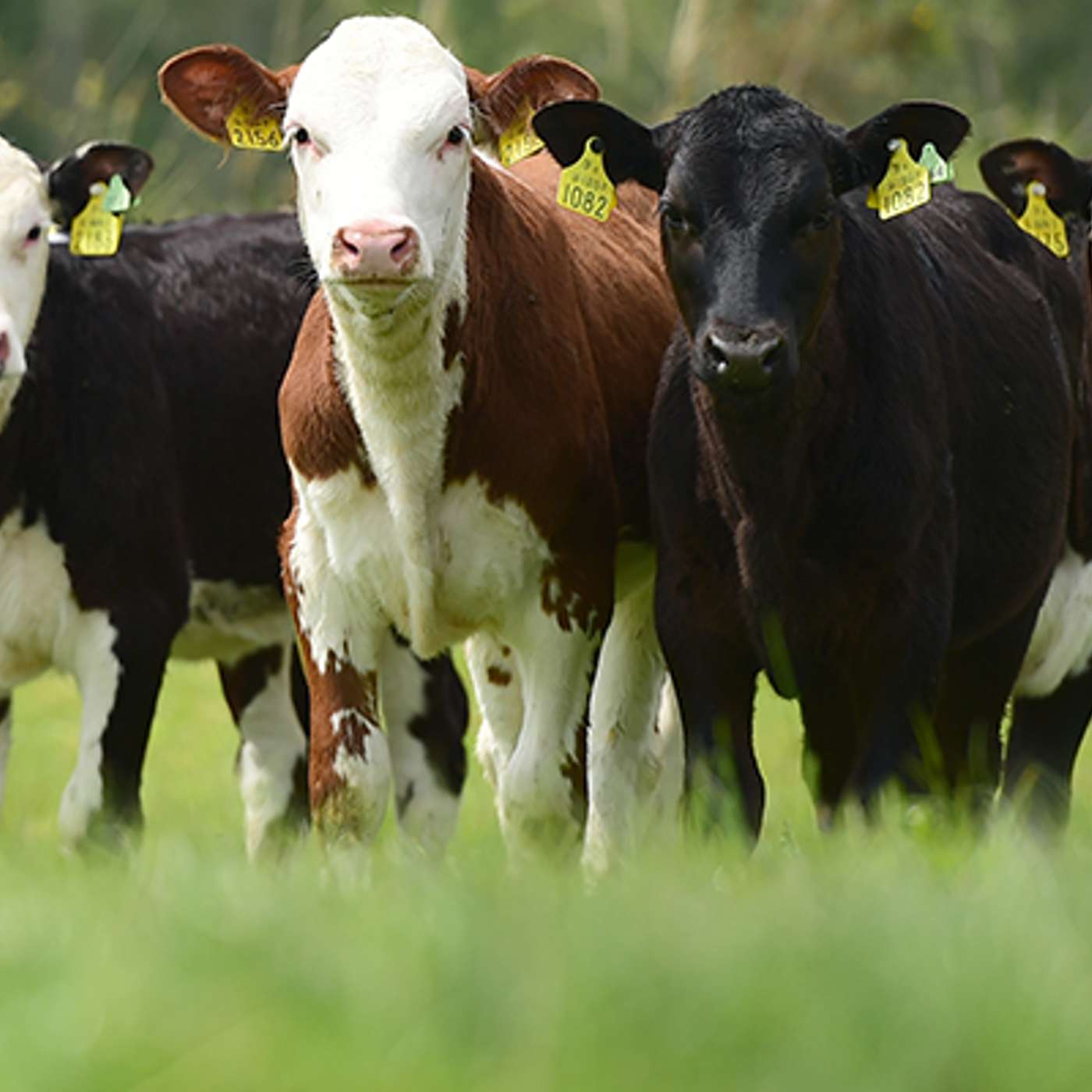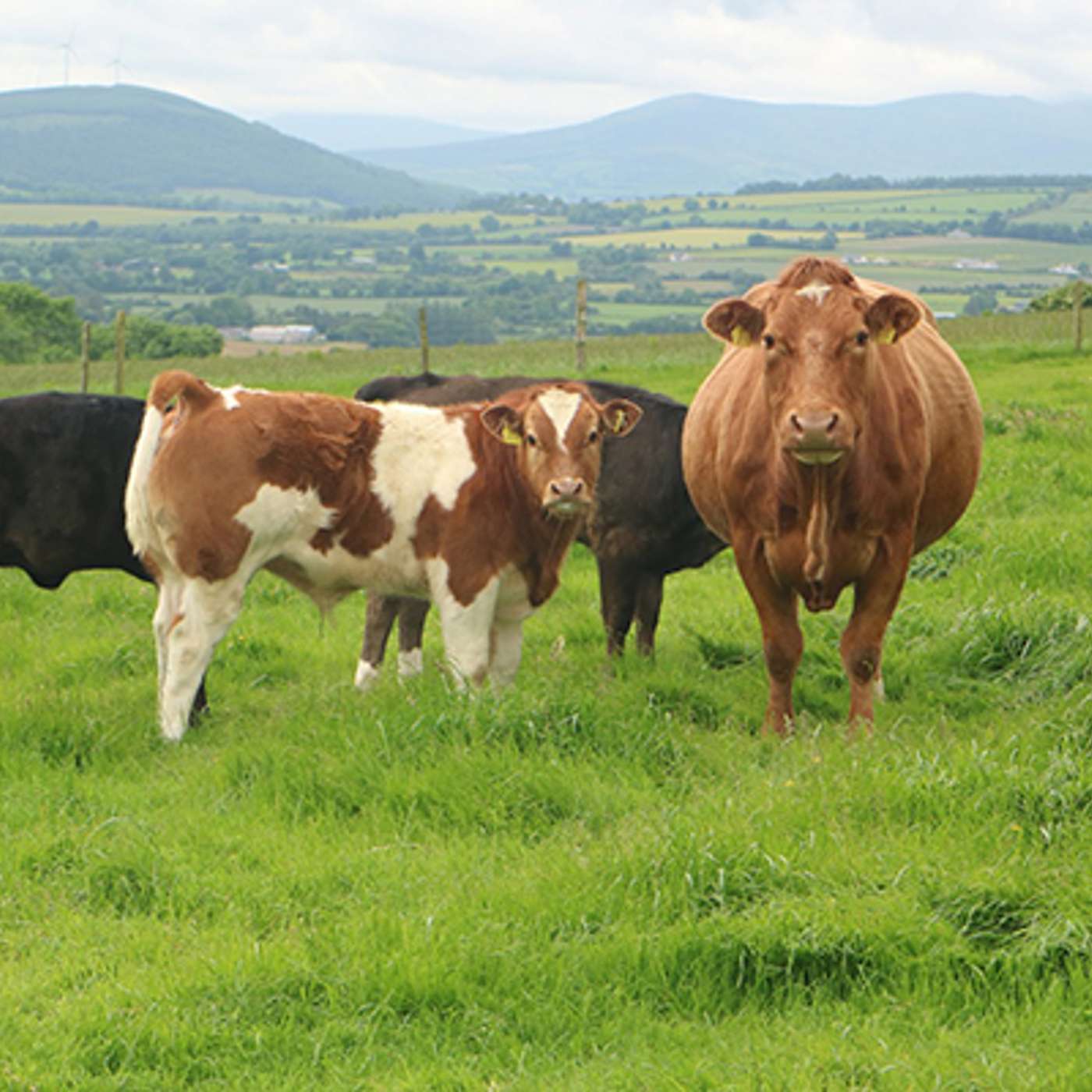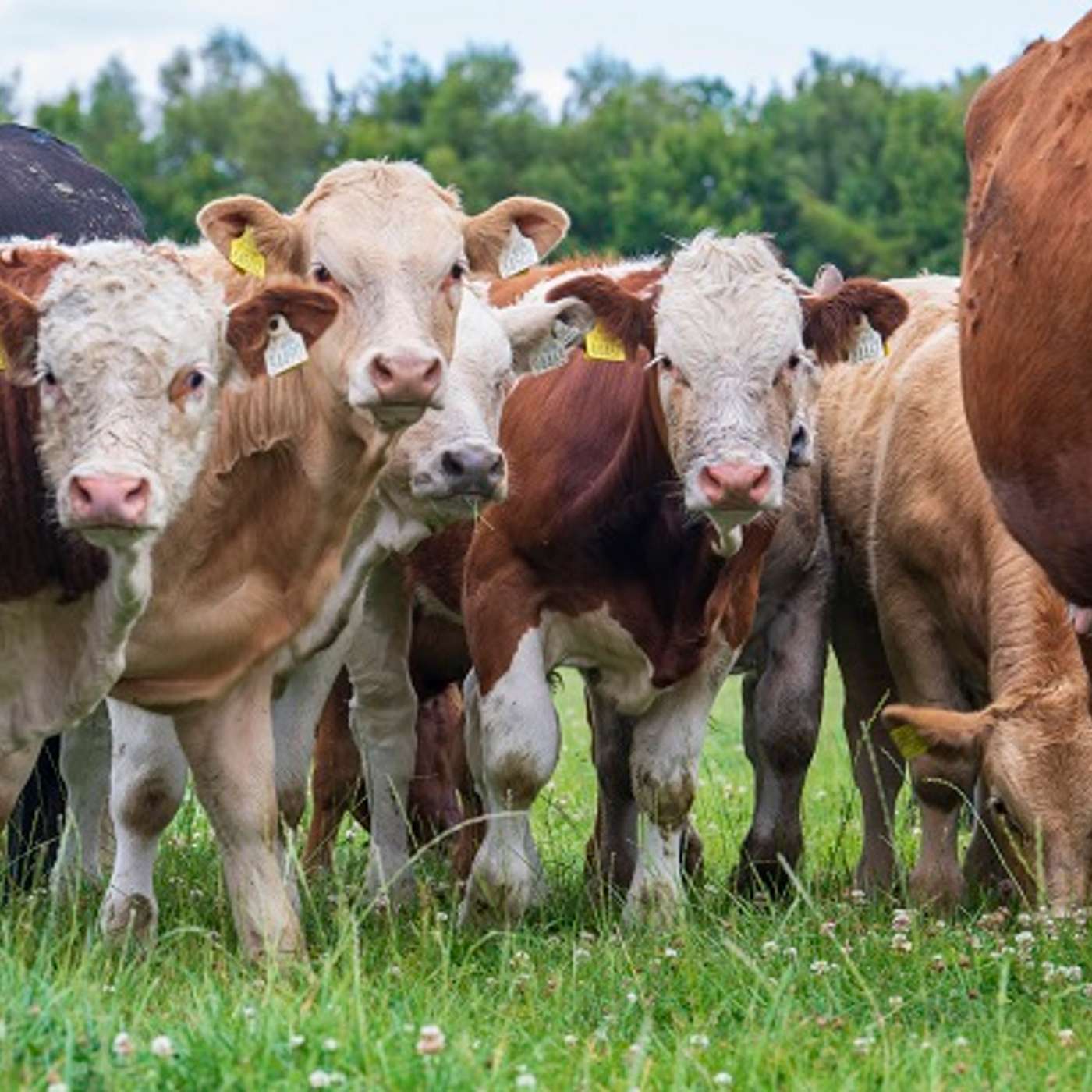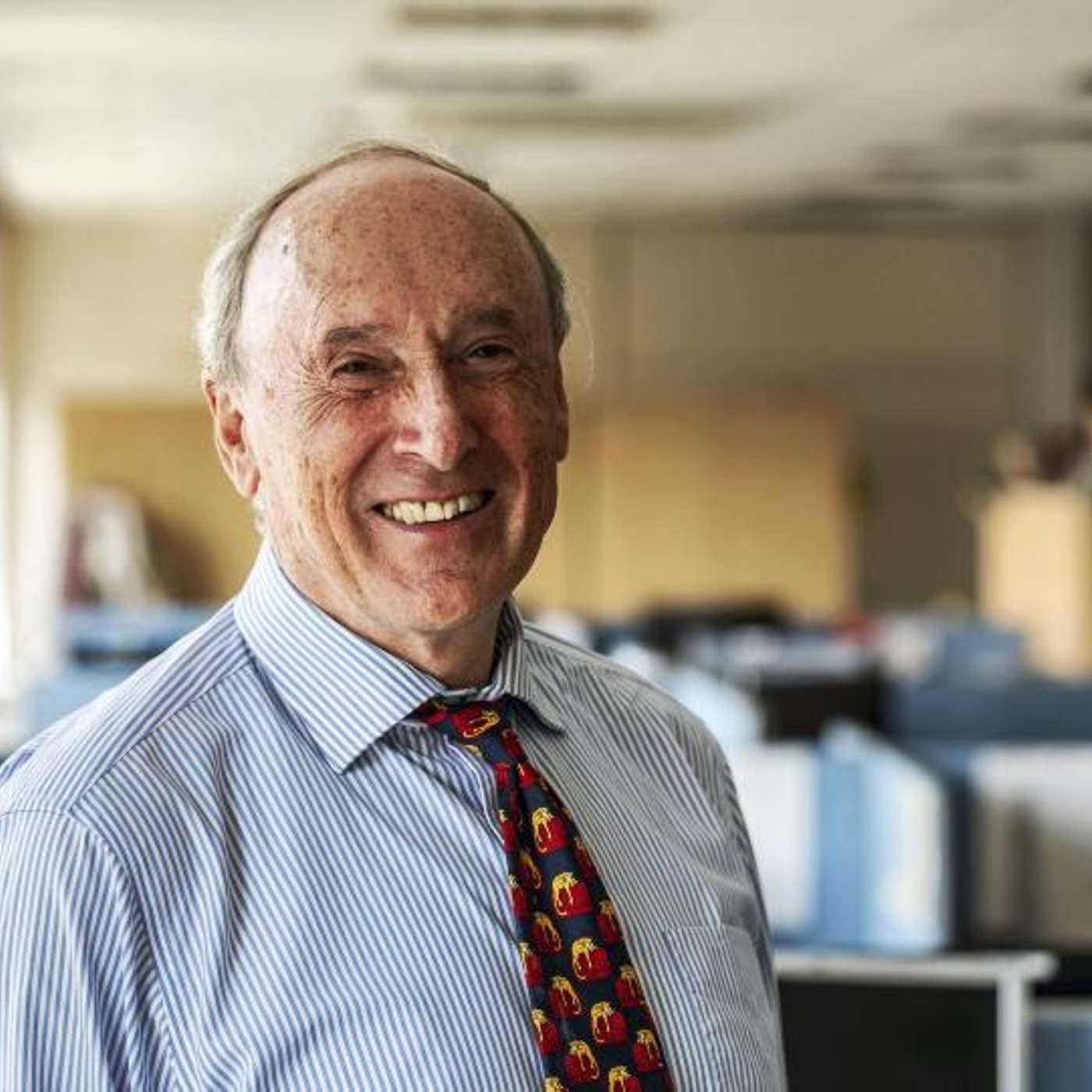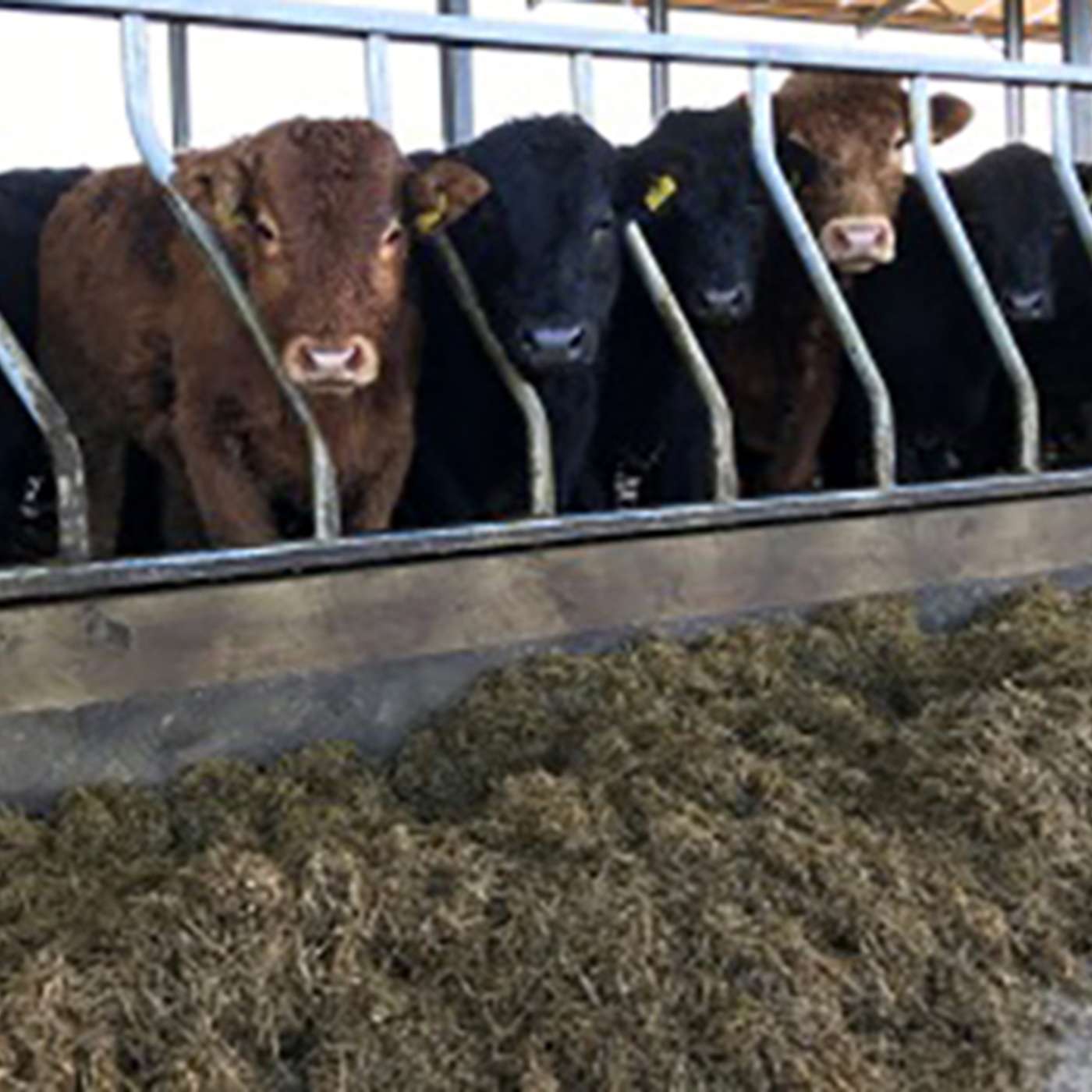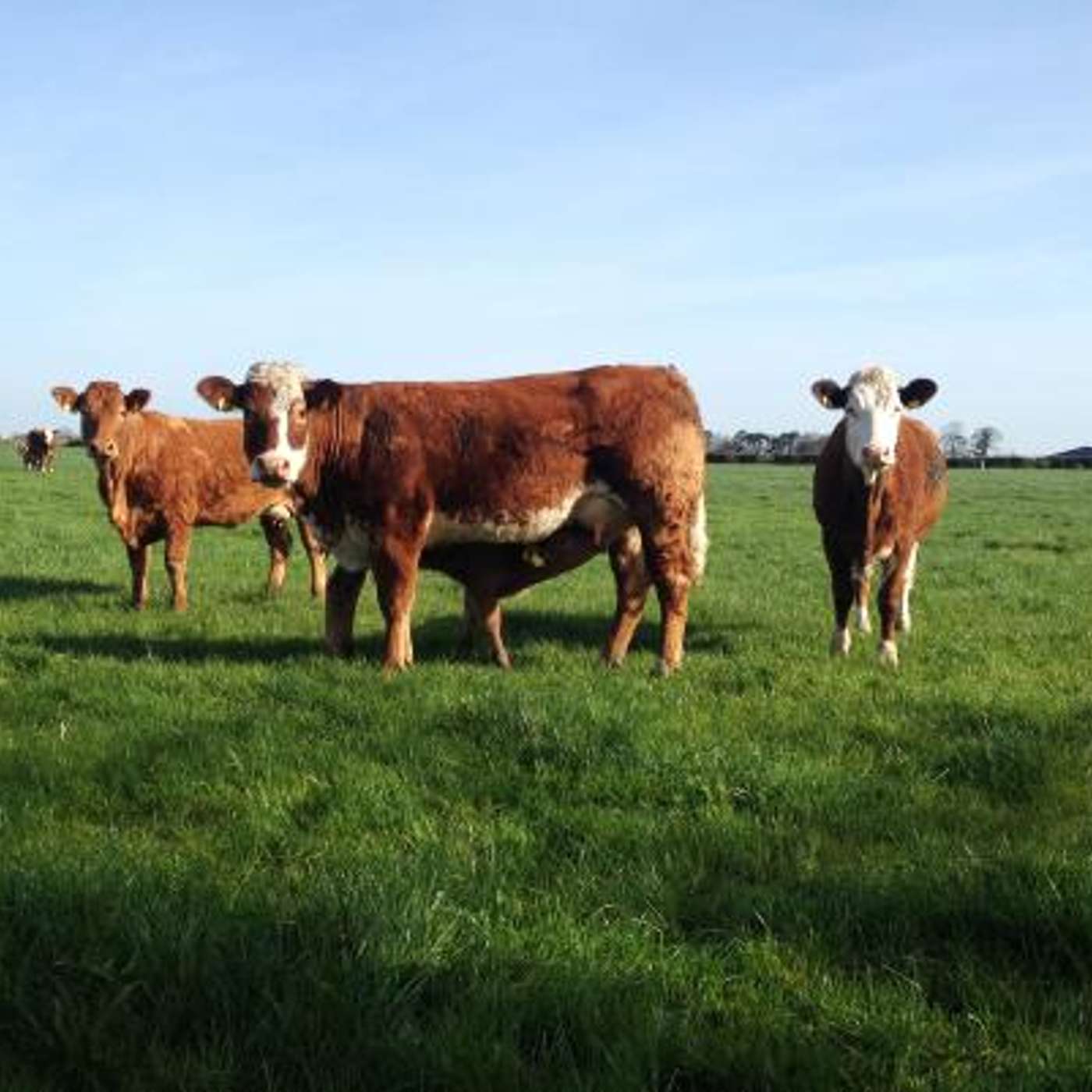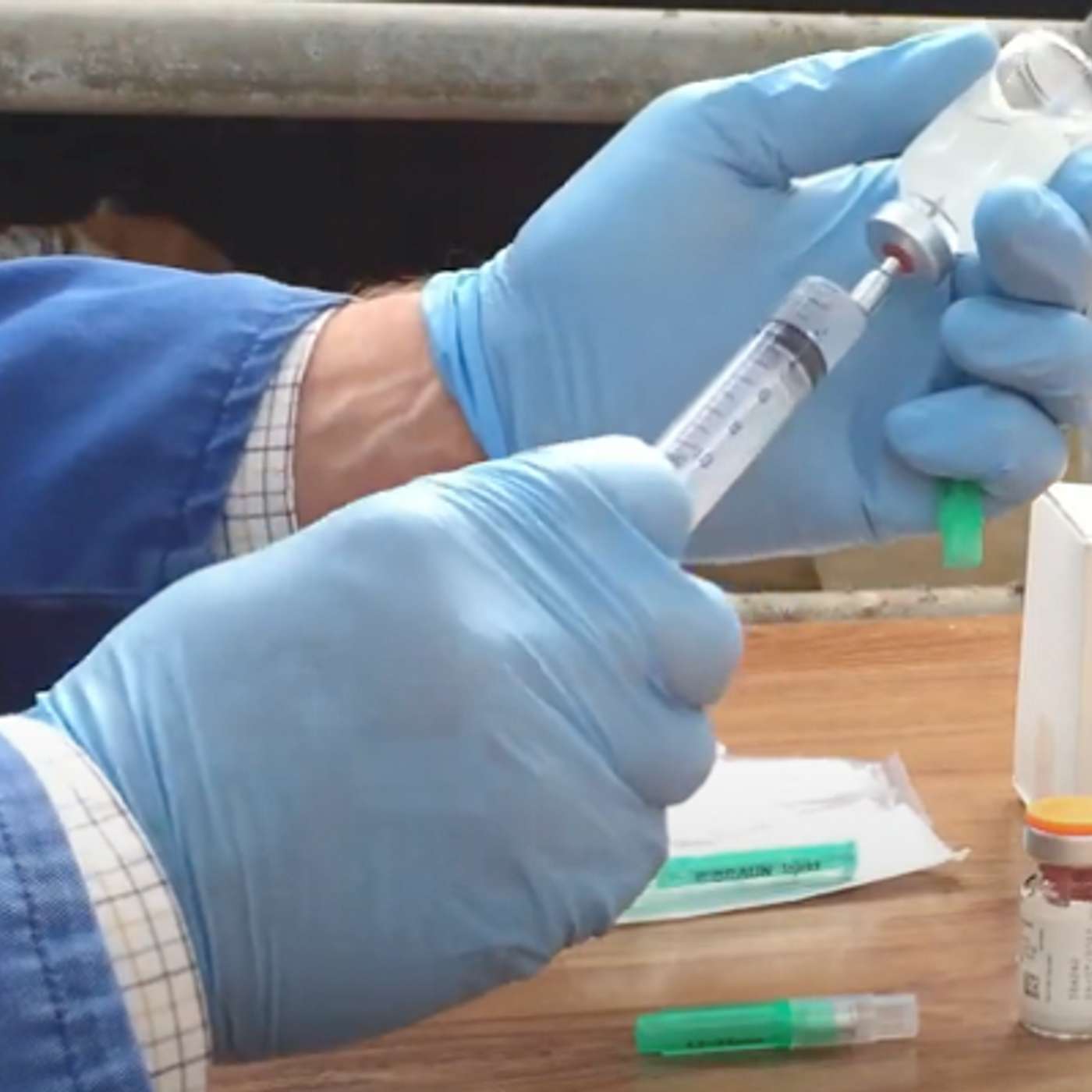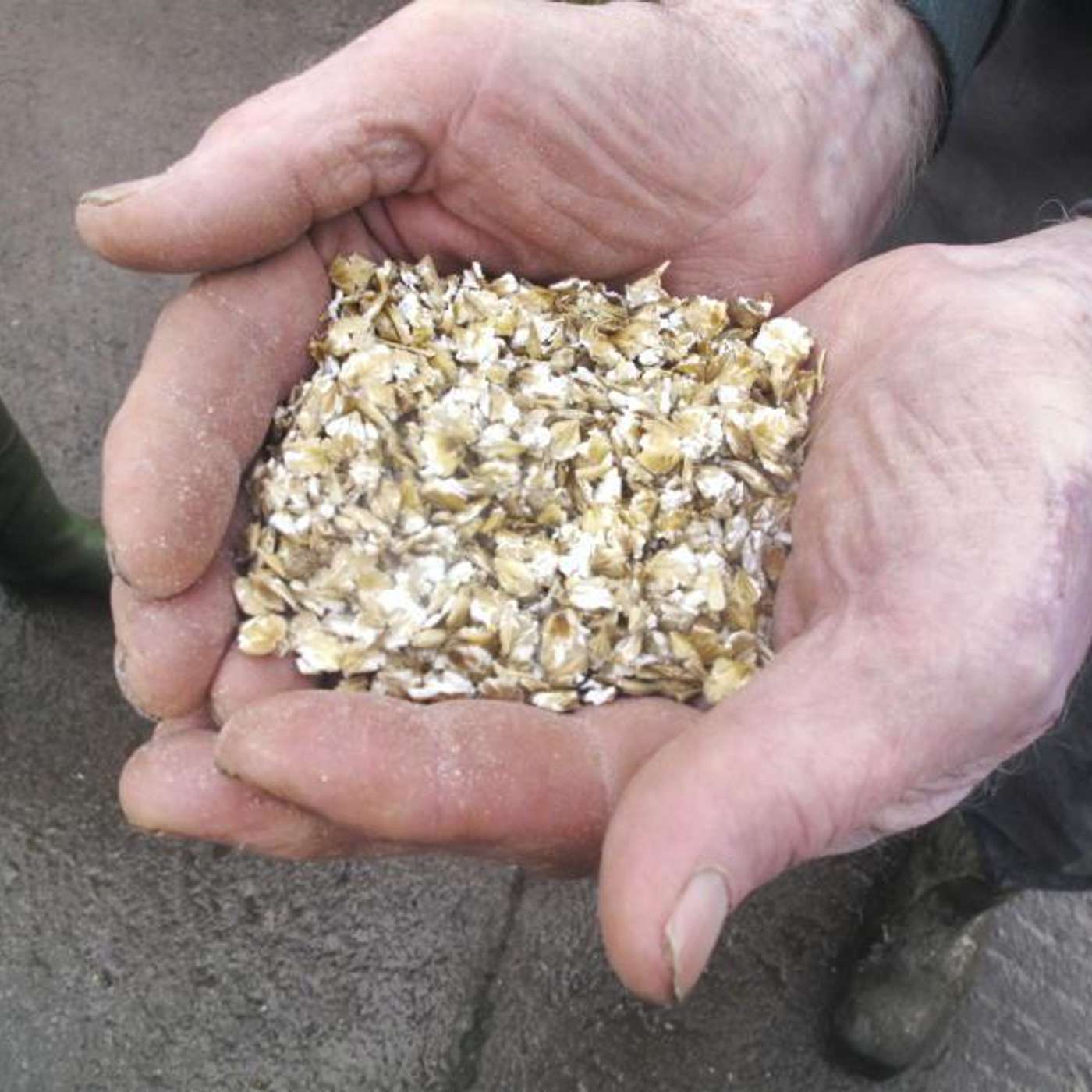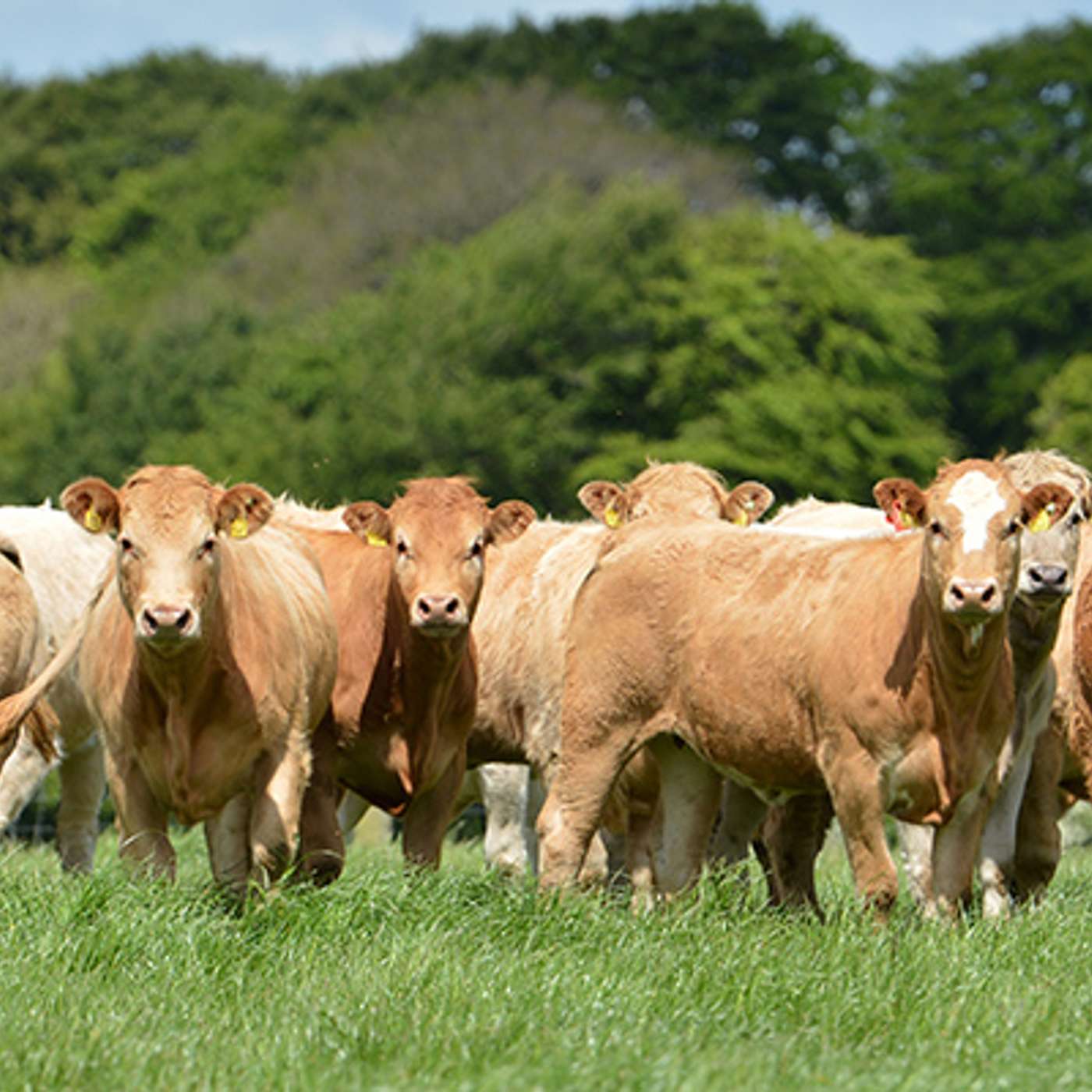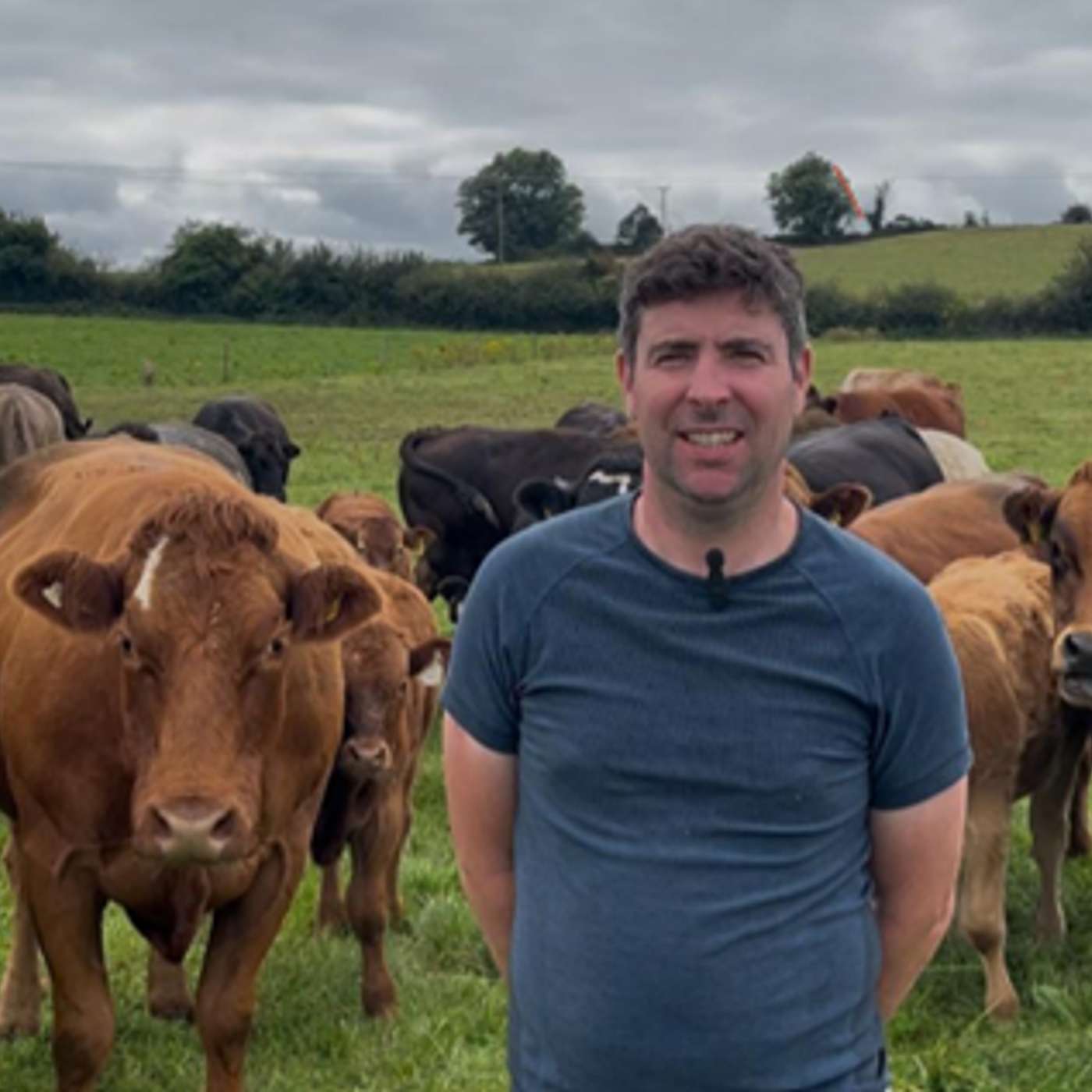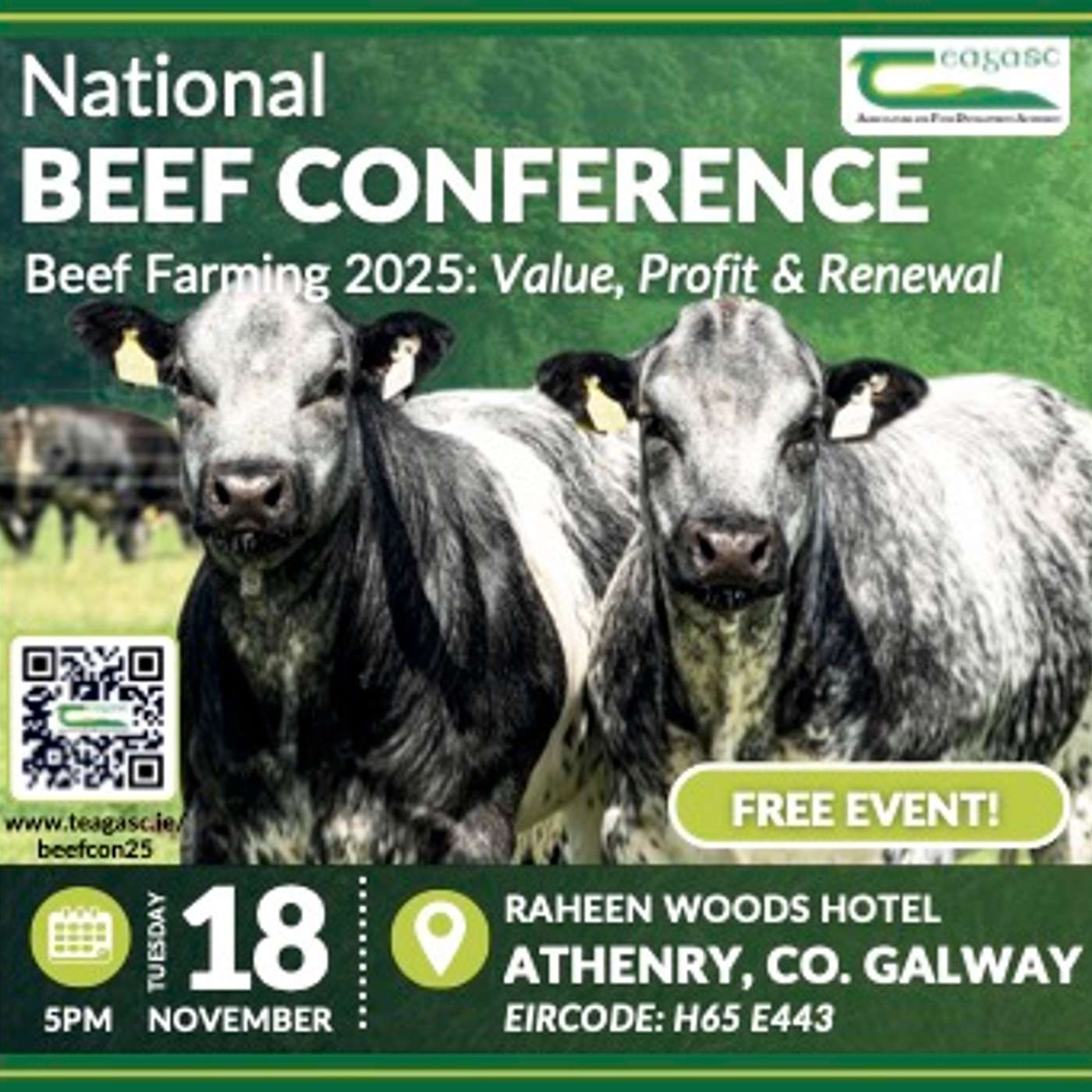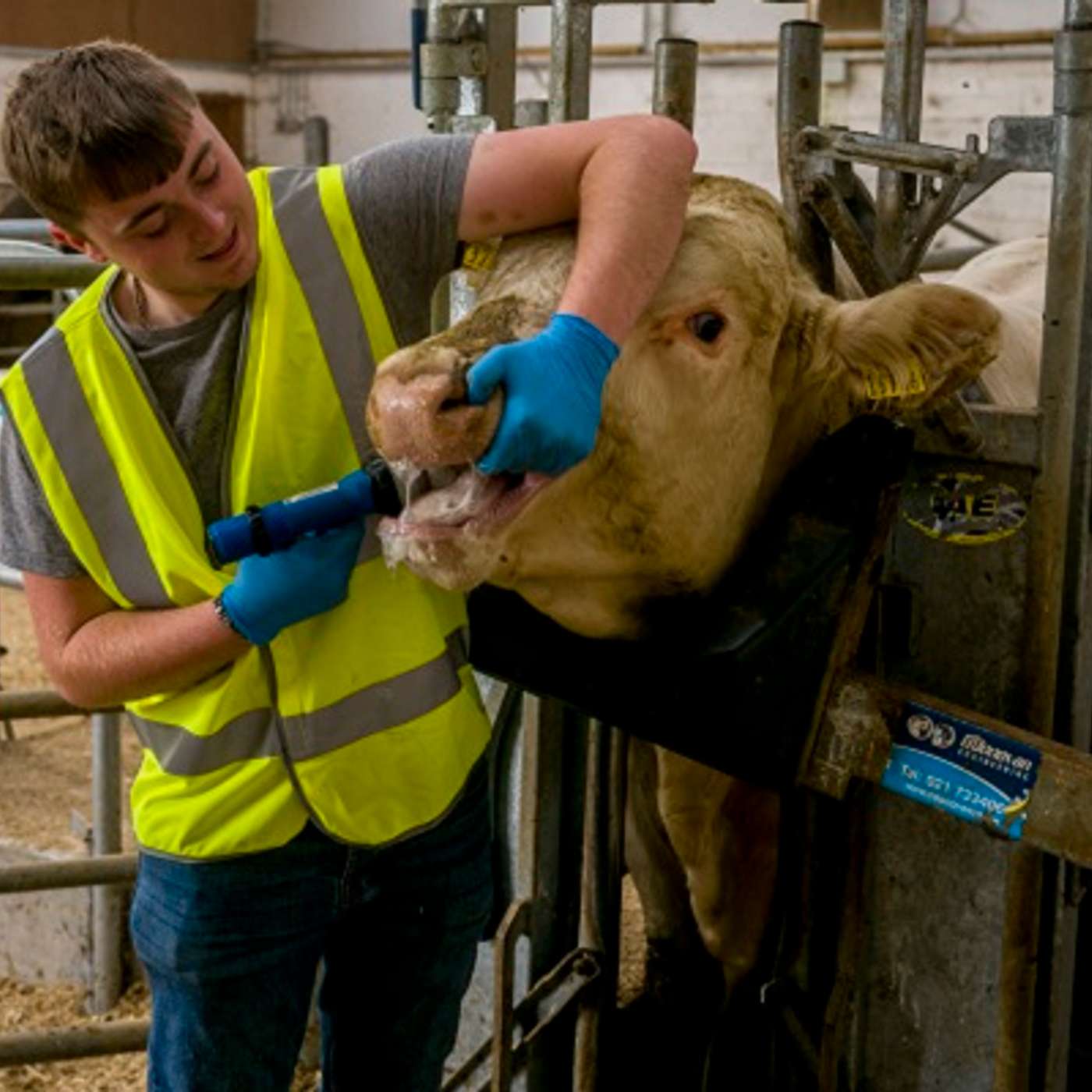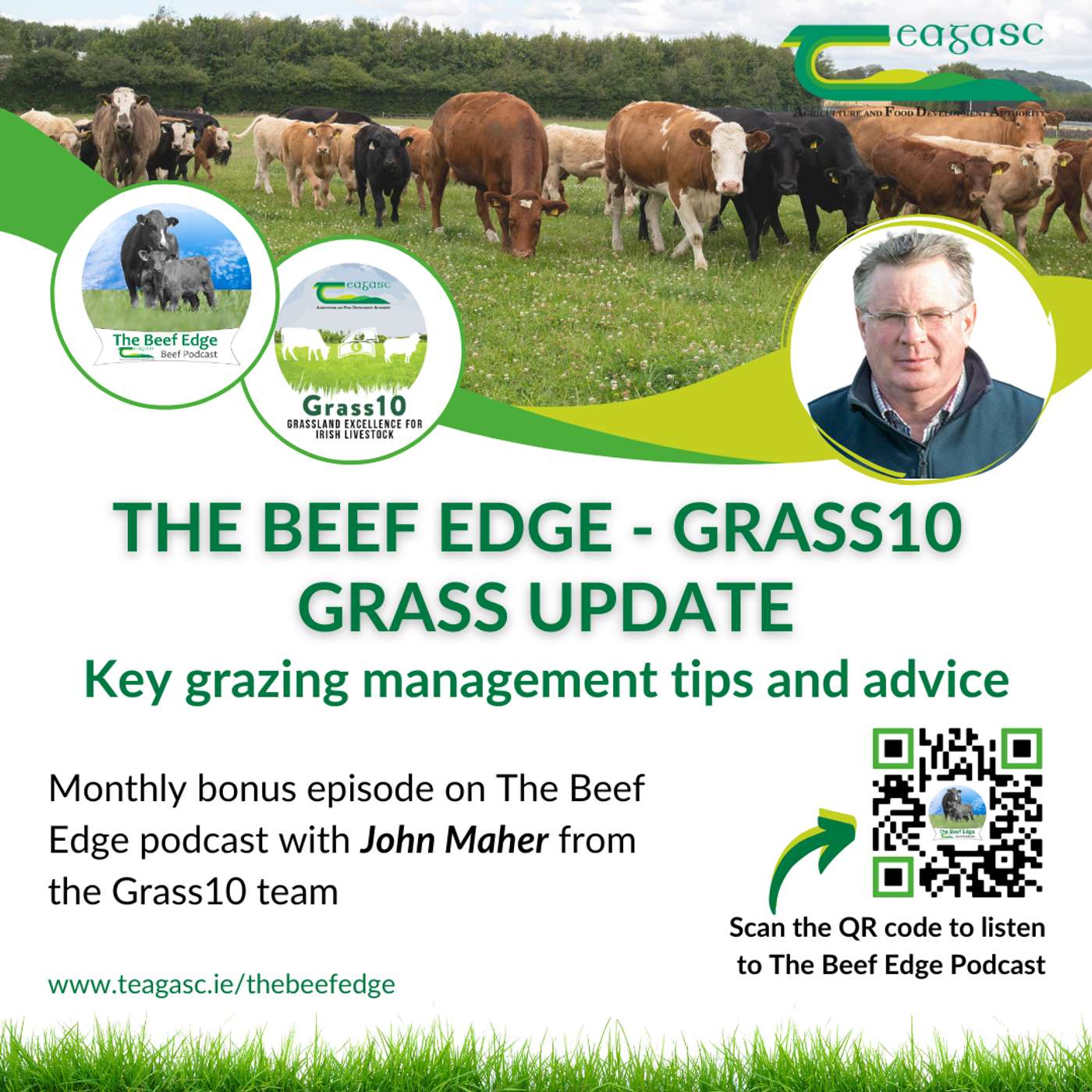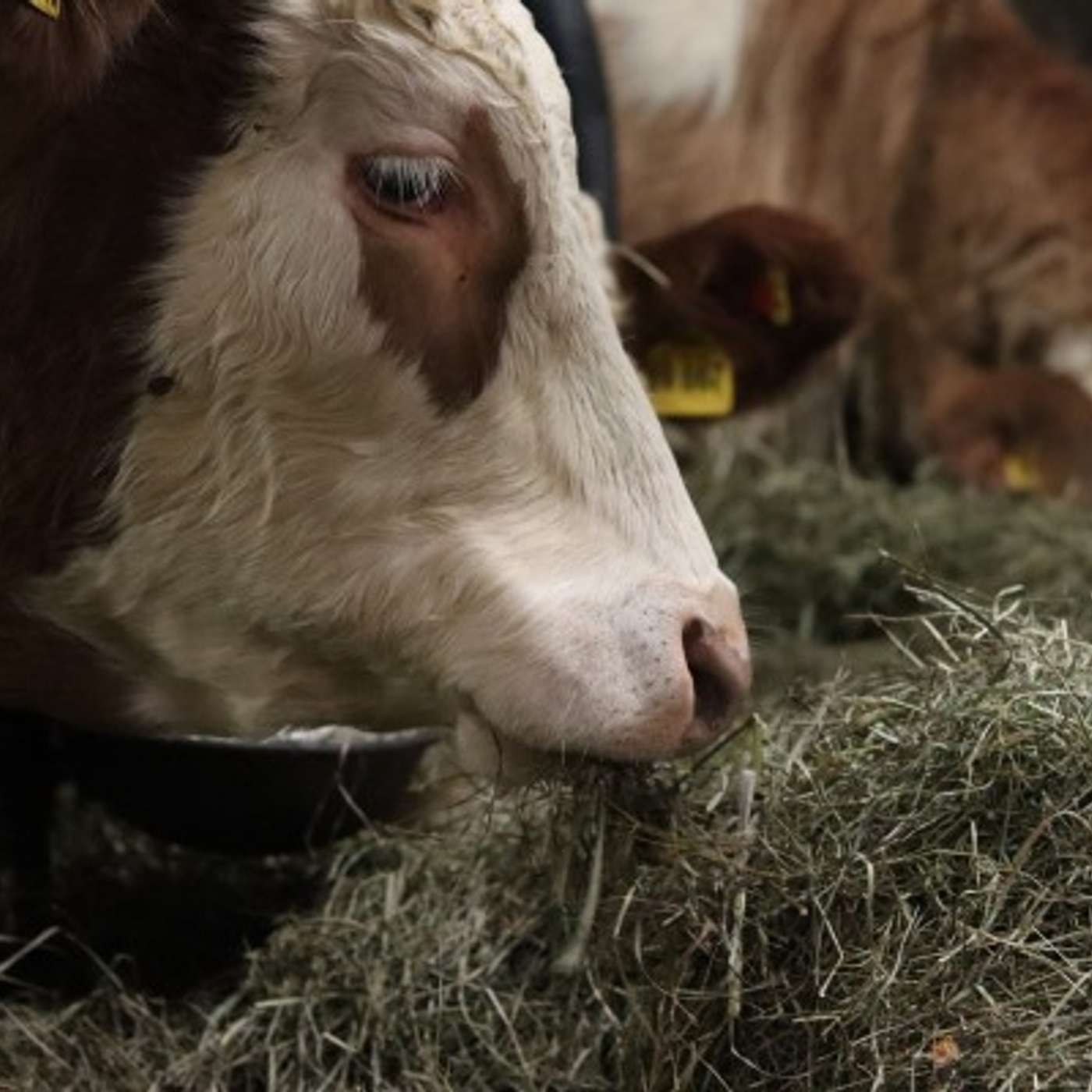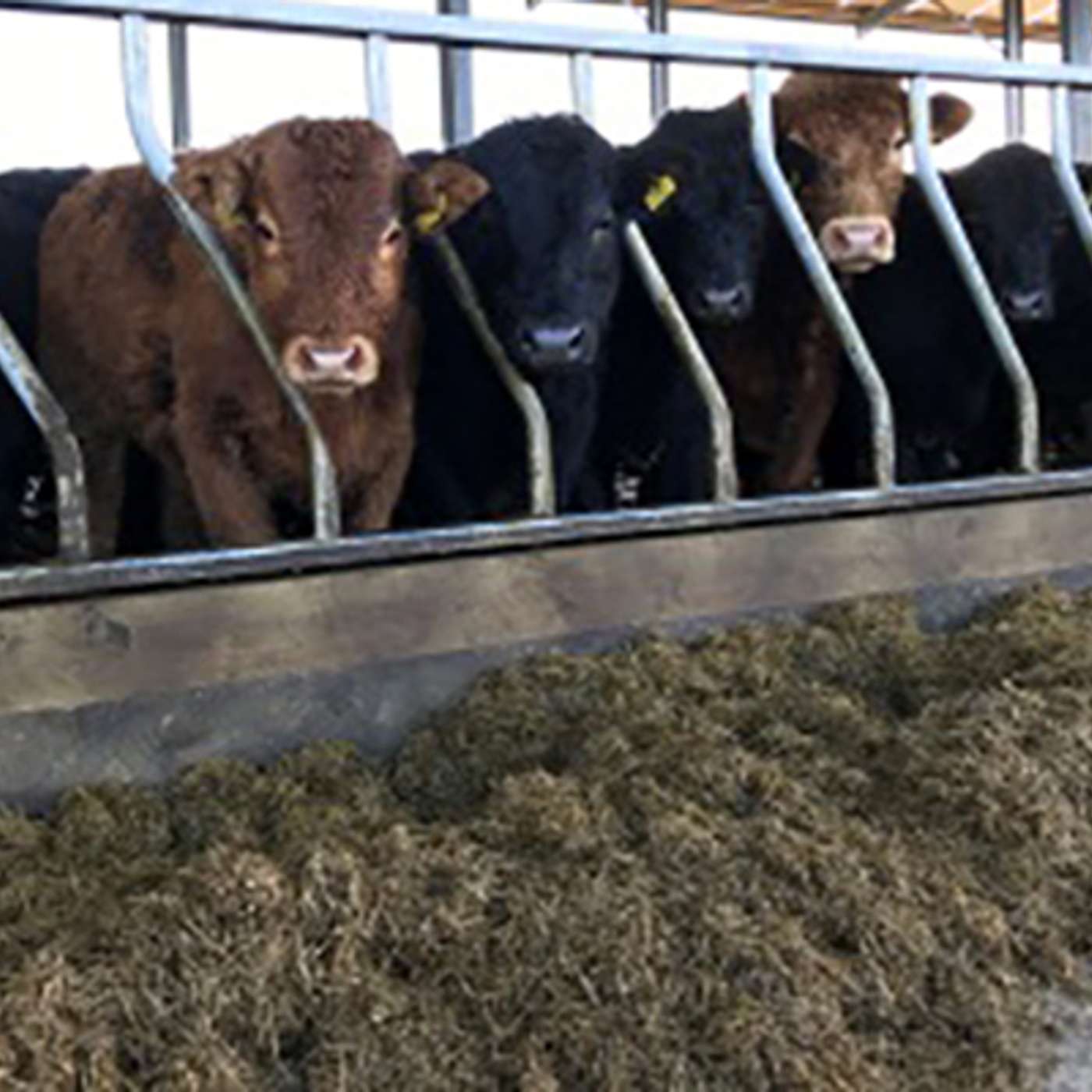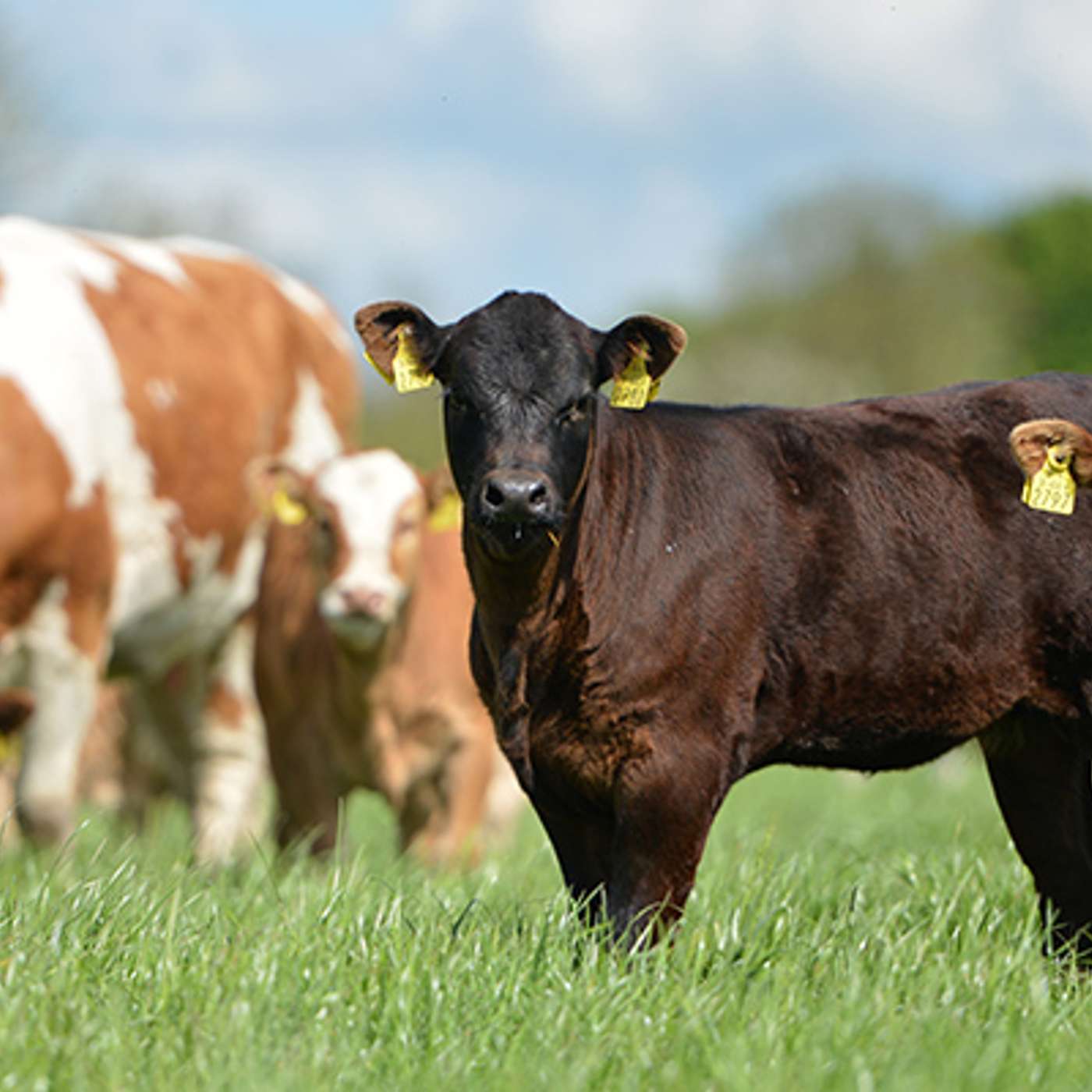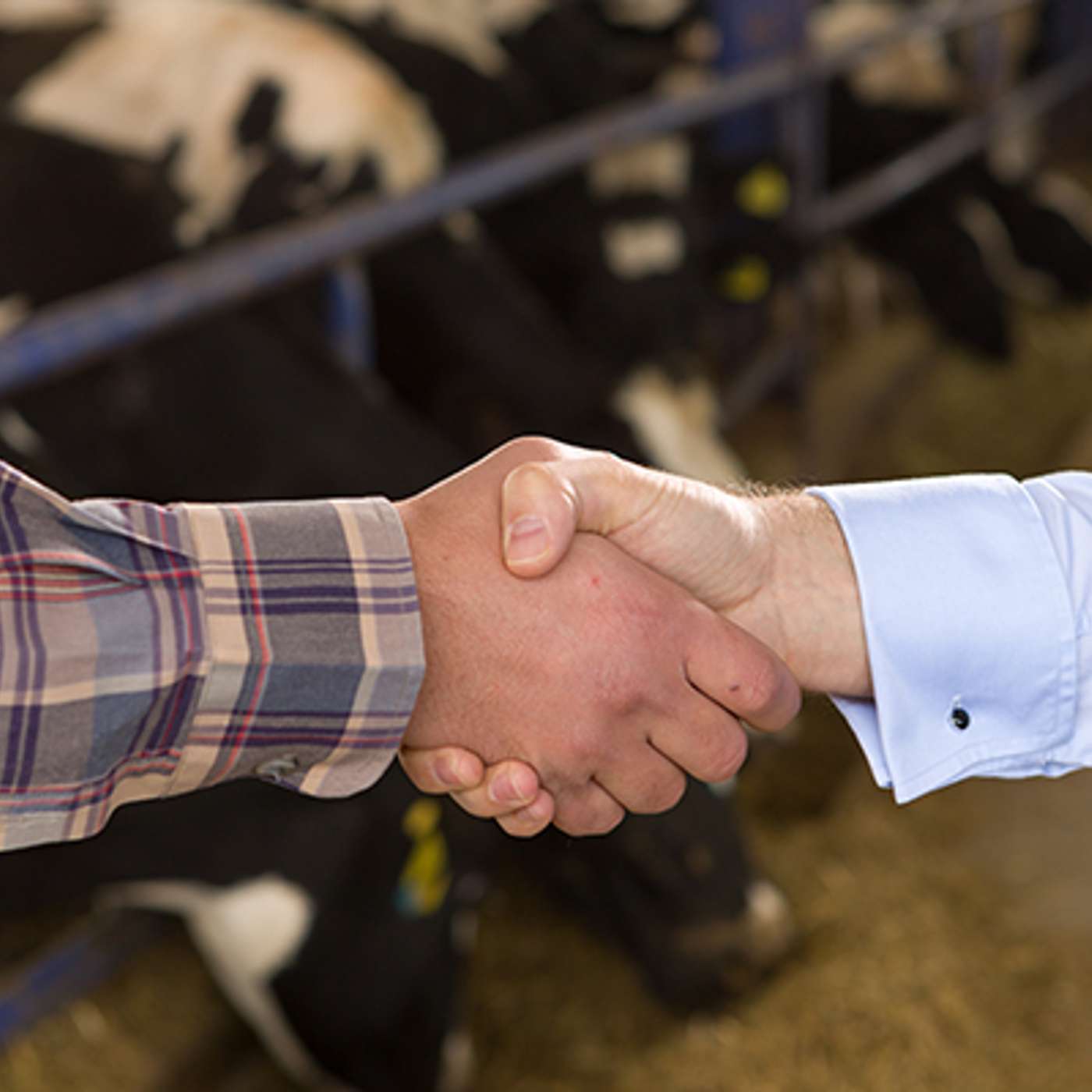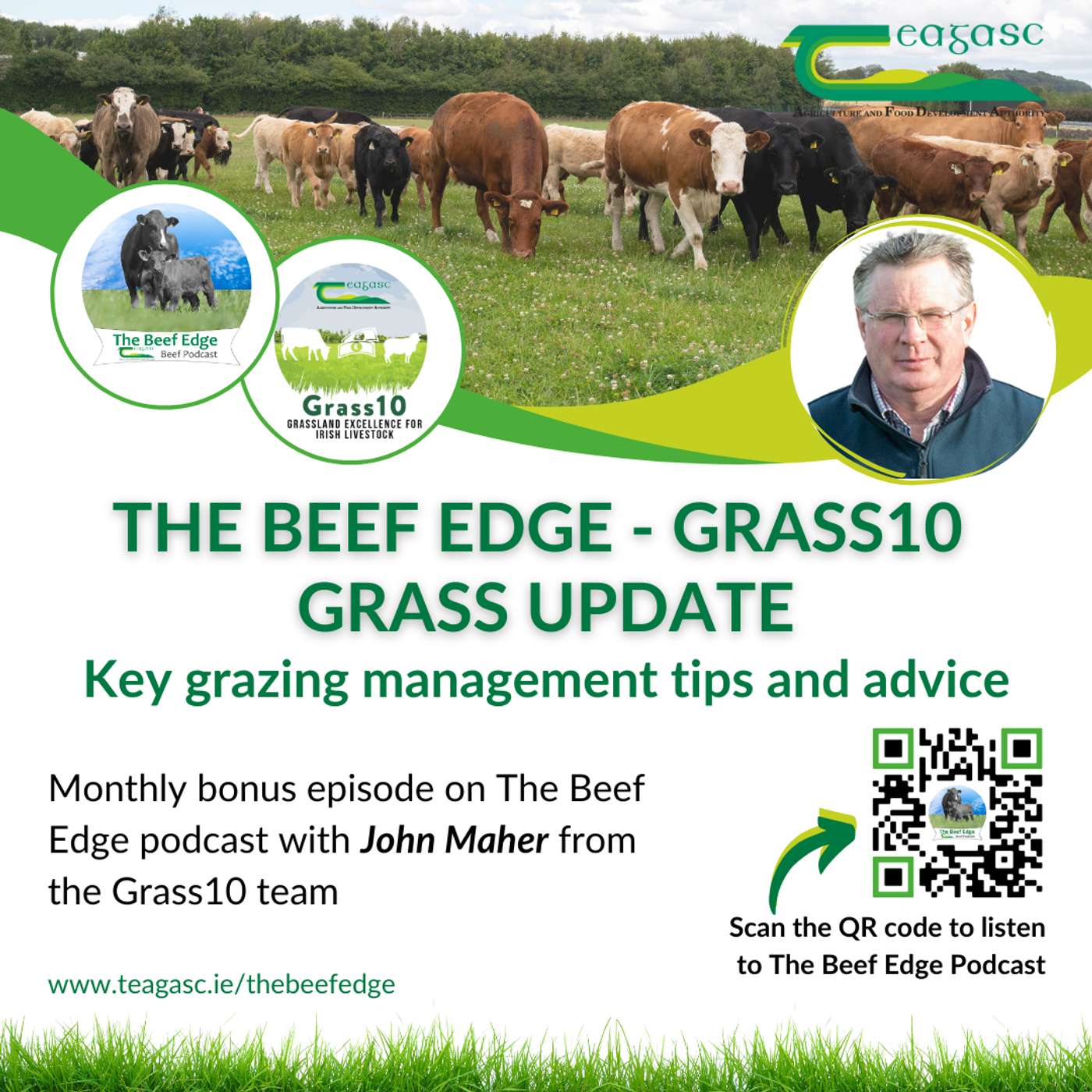Discover The Beef Edge
The Beef Edge

The Beef Edge
Author: Teagasc
Subscribed: 183Played: 5,374Subscribe
Share
© Teagasc
Description
The Beef Edge is Teagasc’s podcast for all the latest news, information and advice for Irish beef farmers, presented by Catherine Egan.
Visit the show page at: https://www.teagasc.ie/animals/beef/the-beef-edge-podcast/
Visit the show page at: https://www.teagasc.ie/animals/beef/the-beef-edge-podcast/
328 Episodes
Reverse
For the second part of the 'Dairy Calf to Beef’ series’ on the Beef Edge, Teagasc Beef Specialist, David Argue, discusses what to be aware of when sourcing calves and the essential things to get right during the rearing process. David explains that when sourcing dairy-beef calves this spring, the health of the calf, breed and genetic make-up are very important. Avoid any signs of ill health, and minimise stress around purchase and transport. Good ventilation, bedding, and stocking density are important to reduce disease. David says that a good milk replacer is essential an keeping a routine at feeding time is important. Daily liveweight gain should ideally double from purchase at 3 weeks of age to 12 weeks of age gaining 0.8kg/head/day. It is essential that the calf has a well-developed rumen and maximises early life performance to ensure good thrive going forward. David also highlights that developing a farm-specific health plan with a vet is key to ensure issues from previous years are resolved and overcome. Further details at:https://teagasc.ie/animals/beef/dairy-calf-to-beef/dairybeef-500/dairybeef-500-factsheets/nutritional-management-of-the-dairy-beef-calf/ Teagasc DairyBeef 500 Conference 2026 The Teagasc DairyBeef 500 Conference 2026 will take place on Thursday, January 29th at 7pm at Ballykisteen Hotel, Limerick Junction, County Tipperary, E34 VK12. For more information on the conference: https://teagasc.ie/event/dairybeef-500-conference/ For more episodes from the Beef Edge podcast, visit the show page at:https://www.teagasc.ie/thebeefedge Produced on behalf of Teagasc by LastCastMedia.com
In the first part of a ‘Dairy Calf to Beef’ series on the Teagasc Beef Edge podcast, DairyBeef 500 Manager, Alan Dillon, discusses the key performance indicators of a sustainable, profitable dairy beef system. Alan outlines the importance of increased grass utilisation, improved silage quality, a good herd health plan and daily liveweight gains and the impact breed and commercial beef value can have in a dairy beef system. Age at slaughter is fam and system specific and Alan discusses the impact both have on margin. Completion and analysis of the DairyBeef 500 profit monitors is currently underway. Alan discusses variable and fixed costs on the farm and the impact calf price can have. Teagasc DairyBeef 500 ConferenceThe Teagasc DairyBeef 500 Conference 2026 will take place on Thursday, January 29th at 7pm at Ballykisteen Hotel, Limerick Junction, County Tipperary, E34 VK12. Featuring an array of expert speakers, the conference will cover some of the important areas of dairy calf to beef production. A panel discussion with farmers and advisors will discuss the areas of focus for 2026 while also reflecting on the positives from 2025. For more information on the conference, visit here: https://teagasc.ie/event/dairybeef-500-conference/ For more episodes from the Beef Edge podcast, visit the show page at:https://www.teagasc.ie/thebeefedge Produced on behalf of Teagasc by LastCastMedia.com
Teagasc Beef Specialist, Niall Kerins, is on this week’s Beef Edge podcast with some of the key management tips for the weeks ahead. Niall discusses the importance of using a pre-calving mineral on farm and he outlines some key things to have on hand in advance of calving cows and purchasing calves. Niall also explains the importance of updating your nutrient management plan on the farm in 2026 and says now is an ideal time to take soil samples in advance of slurry being applied. For more episodes from the Beef Edge podcast, visit the show page at:https://www.teagasc.ie/thebeefedge Produced on behalf of Teagasc by LastCastMedia.com
Pearse Kelly, Teagasc Head of Drystock, is on this week’s Beef Edge podcast to reflect on beef supply, market and beef prices in 2025 and how to plan for 2026. Bord Bia had forecast the national kill would be back 70,000-90,000 in 2025 but that has been closer to 200,000. This is likely to remain similar in 2026. Pearse’s long term outlook is positive but he says that farmers should complete a profit monitor in 2025 to assess performance and costs prior to 2026. Rupert Claxton also spoke at this year’s Beef Conference giving a broad global view of beef with further details here: https://teagasc.ie/publications/national-beef-conference-2025/ You can also watch the recent beef webinar at:https://www.youtube.com/watch?v=ntJD2zfLVmM For more episodes from the Beef Edge podcast, visit the show page at:https://www.teagasc.ie/thebeefedge Produced on behalf of Teagasc by LastCastMedia.com
For this special Christmas episode of The Beef Edge, we’re re-visiting our 300th episode of the podcast that was recorded earlier this year with Matt Dempsey, whose career spans multiple decades and various roles in agricultural journalism and beyond. Matt has been instrumental in driving innovations in Irish agriculture through his work as a journalist, farmer and chairman of various industry groups and he gives his outlook for the Irish beef industry. Matt discusses intervention, suckler incentive scheme, beef tribunal, BSE and Foot and Mouth to name but a few. Matte highlights the work done by the Irish Cattle Breeding Federation as a significant breakthrough as well as the emphasis on easy calving, and also of marbling of beef. He also comments on the emergence of grazing management, fertiliser, and especially grass varieties and reseeding that have been revolutionary. Matt discusses a previous campaign that the Farmers' Journal and the IFA carried out in relation to Brazilian beef which succeeded in getting the actual import regime changed at Brussels level when the beef trade in Ireland and Europe looked as if it was going to be fundamentally undermined. A huge thanks to everyone that has appeared on the Beef Edge podcast over the past 300 episodes and to all the listeners for making the podcast such a success - wishing you and yours a very Merry Christmas. For more episodes from the Beef Edge podcast, visit the show page at:https://www.teagasc.ie/thebeefedge Produced on behalf of Teagasc by LastCastMedia.com
For a special joint podcast on bluetongue, with Stuart Childs from the Dairy Edge and Ciaran Lynch from Ovicast, this week’s Beef Edge is joined by vet John Donlon to find out more about bluetongue. Primarily transmitted via biting midges, the cases on farms in Northern Ireland significantly reinforces the need for increased awareness in the Republic of Ireland. Early action, identification and isolation will be key in reducing the potential for further virus spread. Temperature is a major factor in the transmission of bluetongue. The typical transmission period usually runs from late spring to early autumn, especially during the summer months. During the winter, the risk of disease spread is much lower. Bluetongue is associated with many symptoms. Typically, in affected cattle and sheep, the main symptoms may include: fever and loss of appetite; drop in milk yield (dairy cows); reddening of mucous membranes; sores on the nose, gums or dental pads; swelling of the face, lips or tongue (‘blue tongue’); breathing difficulties, drooling or nasal/eye discharge; lameness due to inflammation at the top of the hoof; abortion or foetal deformities; and, in severe cases, infection can result in death. For further info: Teagasc urges vigilance on bluetongue - Teagasc | Agriculture and Food Development Authority Bluetongue is a notifiable disease, meaning anyone who suspects an animal may have the disease is legally obliged to notify DAFM without delay. To report a suspected case of Bluetongue virus to the Department of Agriculture, Food and the Marine (DAFM), you should immediately contact your local Regional Veterinary Office (RVO) or the National Disease Emergency Hotline. Contact Details:· During office hours (9 am - 5 pm): Contact your local Regional Veterinary Office (RVO)· Outside office hours (operational 365 days a year): Ring the National Disease Emergency Hotline at 01 492 8026 For more episodes from the Beef Edge podcast, visit the show page at:https://www.teagasc.ie/thebeefedge Produced on behalf of Teagasc by LastCastMedia.com
Dr. Paul Crosson, Beef Enterprise Leader, Teagasc Grange, is on this week’s Beef Edge to discuss the latest research being carried out in 2025 and the plans for 2026. Pauls highlights the current research underway on the Derrypatrick and Maternal Herd and he outlines the findings from the dairy beef work being carried out as well as the latest research relating to additives. You can also watch the recent Teagasc Beef Webinar with Paul at: https://www.youtube.com/watch?v=ntJD2zfLVmM For more episodes from the Beef Edge podcast, visit the show page at:https://www.teagasc.ie/thebeefedge Produced on behalf of Teagasc by LastCastMedia.com
Rebecca Fitzpatrick, Superintending Veterinary Inspector with the Department of Agriculture, outlines the changes affecting beef and sheep farms this year on this week’s joint Beef Edge and OviCast podcast. From 1st December, new rules on veterinary medicines came into effect as part of Ireland’s national strategy to tackle antimicrobial and anti-parasitic resistance. These changes mean that a range of commonly used products will now require a veterinary prescription, and all prescriptions will be issued and recorded through the National Veterinary Prescription System, or NVPS. To help explain what this means day-to-day on your farm, Rebecca looks back at the background to AMR and APR, and she discusses why moving certain products to prescription-only status is necessary. Rebecca explains that all prescriptions must go through NVPS, the national online system. While farmers can still choose where to buy, retailers just need the valid NVPS prescription. She says it is important to start planning earlier with your vet, especially during busy dosing seasons.For more information: https://www.gov.ie/en/department-of-agriculture-food-and-the-marine/services/national-veterinary-prescription-system/ For more episodes from the Beef Edge podcast, visit the show page at:https://www.teagasc.ie/thebeefedge Produced on behalf of Teagasc by LastCastMedia.com
Ronan Lynch, agronomist with Deeside Agri, and suckler and beef finisher, Brian Kirk from Co. Louth, are on this week’s Beef Edge to discuss the opportunity of using native grains in rations. Ronan explains that of the 7 million tonnes of grains used in the country, only 2 million are produced in Ireland. He highlights the benefits of oats and reducing the carbon footprint by incorporating homegrown grain ore in rations such as oats. We often hear that barley is the premium grain, and oats are just a second-best option for livestock. However, Teagasc trials showed that when feeding finishing beef cattle on a grass silage-based diet, rolled oats performed just as effectively as rolled barley. Brian then details his suckling and finishing system and discusses how performance on his farm has improved by using oats in the rations. Further details at:https://teagasc.ie/publications/oats-a-high-performing-native-grain/ For more episodes from the Beef Edge podcast, visit the show page at:https://www.teagasc.ie/thebeefedge Produced on behalf of Teagasc by LastCastMedia.com Image: FarmersJournal.ie
Rupert Claxton, Meat & Livestock Director, GIRA, is on this week’s Beef Edge podcast discussing the global outlook for the beef industry. Rupert highlights that the supply of beef is tight, while demand from the consumer is remarkably robust. The result of good global demand and tight supply are the high prices seen today. Rupert explains how several UK retailers have included beef from a variety of non-European sources on their retail shelves during 2025, however, outlook for 2026 is a continuation of the current trend, both in Europe and globally. He says that Ireland is well placed to produce more beef in a way that is both environmentally and commercially sustainable and he emphasises there are opportunities for investment in the beef sector but rationalisation at industry and farm level is needed to deliver efficiencies. For more visit:https://teagasc.ie/publications/national-beef-conference-2025/ For more episodes from the Beef Edge podcast, visit the show page at:https://www.teagasc.ie/thebeefedge Produced on behalf of Teagasc by LastCastMedia.com
With the Teagasc National Beef Conference taking place on Tuesday, the 18th of November at the Raheen Woods Hotel in Athenry, County Galway, Future Beef farmer, John Barry from Nenagh, County Tipperary, is on this week’s Beef edge podcast to explain his suckling-to-weanling system and how he balances shape and quality to meet both home and export market demands. John Barry runs a 90-cow suckler herd full-time and since taking over the farm in his own name a decade ago, John has steadily developed the enterprise with significant investments, including new sheds, upgraded laneways and fencing, and the installation of a new cattle crush to make vaccinating and dosing more efficient. The herd is split between spring and autumn calving, with around 60 cows calving from February to April and the remainder from August to October. The preferred cow type on the farm is a Limousin–Simmental cross, although Charolais and Belgian Blue crosses also feature in the herd. Most cows are R+ to U– grade animals with good milk. Artificial insemination (AI) is used on more than 75% of the herd. John selects sires from Belgian Blue, Charolais, and Limousin breeds, while a Limousin stock bull is used for mop-up. Red Angus sires are also used on Belgian Blue-type heifers. John produces top-quality U and E grade weanlings for both the local and export markets. In recent years, John has placed a strong emphasis on grassland management, focusing on growing and utilising grass more efficiently to reduce costs. He has also incorporated red clover and undertaken arable reseeding to improve farm sustainability and productivity. John is speaking at this year’s National Beef Conference discussing his role in meeting future market demands. Whether you're looking to improve your breeding, plan ahead for tax, or start the conversation about passing on the farm – this event will have something for you. It is a free event and all are welcome. Further details available at:https://teagasc.ie/event/national-beef-conference/ For more episodes from the Beef Edge podcast, visit the show page at:https://www.teagasc.ie/thebeefedge Produced on behalf of Teagasc by LastCastMedia.com
Pearse Kelly, Teagasc’s Head of Drystock, is on this week’s Beef Edge podcast to give an insight into what’s in store at the Teagasc National Beef Conference which is taking place on 18th November in the Raheen Woods Hotel, Athenry, Co.Galway, starting at 5pm. This year’s theme is ‘Beef Farming 2025: Value, Profit and Renewal’, with a strong focus on producing high-value weanlings, managing farm profitability, and supporting generational renewal. There are two action-packed sessions featuring expert speakers, farmer insights, and panel discussions: Session I: High-Value Weanlings – From Breeding to the MarketTime: 5.00pm Chair: Keith Fahy, Teagasc Drystock Advisor & Host of Country Life on Galway Bay FMSpeakers and topics include:· Prof. David Kenny, Head of Animal & Bioscience, Teagasc Grange – Managing the suckler cow before and after calving for better fertility and performance· Dr. Katie Quigley, Geneticist, Irish Cattle Breeding Federation – Understanding the myostatin gene and finding the right balance between muscling and calving ease· John Barry, Future Beef programme participant, will share his approach to breeding weanlings in demand at home and for export· Thomas O’Connor, Beef finishing farmer from Co. Kildare, will discuss what he is looking for when buying cattle to finish on his farm· Brendan Egan, Manager, Castlerea Mart – What the market wants and how to meet that demand Following this, there will be refreshments and an opportunity to meet Teagasc advisers and industry stakeholders Session II: Beef 2025 and Beyond – Prices, Profits & Passing on the FarmTime: 7.15pm Chair: Damien O'Reilly, former presenter of RTÉ Radio 1’s Countrywide· Rupert Claxton, Meat Director at GIRA – Global beef market trends, what’s driving prices, and where the market is going· Trevor Boland, Beef Farmer & IFAC Accountant – Farm profits in 2025 and beyond: practical advice on tax planning and staying profitable Following this is a panel discussion on Generational Renewal – tackling the challenges and solutions of succession on Irish beef farms. Panellists include:· Dr. Emma Dillon, Teagasc National Farm Survey Economist· Ruth Fennell, Collaborative Farming Specialist, Teagasc· Trevor Boland, Beef farmer & IFAC Accountant· Eamonn & Donnchadh McCarthy, suckler farmers from Youghal The evening wraps up by 8.45pm. Experts from the following Teagasc programmes will be available on the night to answer your questions:· Future Beef & DairyBeef500· Teagasc Organic Team· Signpost Programme· Agricultural Sustainability Support and Advisory Programme As International Men’s Day falls on 19th November, the conference will also highlight farmer health and wellbeing. There are information stands and free health checks with Croí, plus foot care advice and mental health supports, while local health initiatives like Healthy Galway and Taking Stock will also be present, offering resources and support. For further details: https://teagasc.ie/event/national-beef-conference/ For more episodes from the Beef Edge podcast, visit the show page at:https://www.teagasc.ie/thebeefedge Produced on behalf of Teagasc by LastCastMedia.com
For the final part of the special series, ‘Getting Winter Ready’, Natascha Meunier from Animal Health Ireland is on this week’s Beef Edge podcast to discuss ‘Health at Housing’. As always, there are liver and rumen fluke, lice and mites, and going in to housing, gutworms or lungworm (hoose) might still be problematic. Natascha says to be particularly careful about lungworm as it has been ideal conditions over the last few weeks. She outlines the products for treating worms and fluke and says the product is very important, particularly when it comes to performance over the winter. Immature flukes keep growing and affect the animal’s performance, so Natascha advises that you might need to go in again a number of weeks later with the same type of product, or you could use a product that targets the younger life stage of the parasites. Natascha then discusses the products to be used for biting and sucking lice and she also outlines the importance of a health plan for purchasing cattle on the farm. For more episodes from the Beef Edge podcast and to listen back to the other two episodes in the ‘Getting Winter Ready’ series, visit the show page at:https://www.teagasc.ie/thebeefedge Produced on behalf of Teagasc by LastCastMedia.com
Grass10 Manager, John Maher, joins Catherine Egan on the latest Beef Edge with grassland management tips for the month ahead. John discusses current grazing conditions and explains the different scenarios across the country. John discusses an action plan for closing up paddocks and he highlights the importance of being flexible and to ensure swards that are closed are not re-grazed again before winter. You can subscribe to the Grass10 newsletter here:https://www.teagasc.ie/crops/grassland/grass10/grass10-enewsletter/ For more episodes from the Beef Edge podcast, visit the show page at:https://www.teagasc.ie/thebeefedge Produced on behalf of Teagasc by LastCastMedia.com
James Strain, nutritionist with Inishowen Co-op, is on this week’s Beef Edge Podcast to discuss ‘Winter Nutrition’. James highlights the importance of a good herd health plan which is key before looking at nutrition to maximise winter performance. When assessing silage quality James explains Dry Matter Digestibility, Dry Matter, Crude Protein and pH, while he also discusses feeding rates to gain 0.5-0.6 kg/head/day on a weanling over the winter. When it comes to rations, James highlights at to look out for on the label, with ideally 5-6 main ingredients:- Energy is the most important nutrient- Protein is needed for growth Information is power – read the feed label carefully & speak with your merchant. For finishing farmers that have cattle housed, James explains what to look for in a ration and building up cattle on ad lib to be managed without any issues. When it comes to mineral inclusion rates James discusses what is important in a pre-calving mineral. Finally, James highlights the upcoming mart events taking place in Donegal on 22nd Oct at the Donegal Livestock Mart, 29th Oct at the Inishowen Livestock Mart and on 4th Nov at Milford Livestock Mart. For more episodes from the Beef Edge podcast, visit the show page at:https://www.teagasc.ie/thebeefedge Produced on behalf of Teagasc by LastCastMedia.com
In the first part of a three-part series, ‘Getting Winter Ready’, on the Beef Edge, Teagasc Beef Specialist, Niall Kerins, discusses ‘Winter Housing’. Housing is a key part of maximising winter performance, farmers can have the nutrition of the animal correct and the animal treated to have them healthy and yet still not be achieving 0.6kg/head/day over the winter period on weanlings. Space allowance is important to determine, how many weanlings/stores/cows should be housed per bay. Feed barrier spacing is often overlooked. Good ventilation is also critical, we often see sheds and maybe there is an issue even though you would think there’s loads of air coming in at either end of the shed. Draughts are just as bad, if not worse, than poor air movement and stuffy conditions. Niall outlines what farmers can do to avoid draughts and assess sheds. Every winter a significant number of cattle are housed and fed in rented sheds. Niall outlines what are the key things to consider if you are interested in renting a shed. Further details at: https://teagasc.ie/news--events/daily/4-key-winter-housing-considerations/ For more episodes from the Beef Edge podcast, visit the show page at:https://www.teagasc.ie/thebeefedge Produced on behalf of Teagasc by LastCastMedia.com
Teagasc Beef Specialist, David Argue, is on this week’s Beef Edge Podcast to discuss beef markets and budgets. David outlines current beef markets and highlights the national weekly kill has risen in the last week of September to 30,000/head. David emphasises the importance of completing a budget tailored to each farm based on input costs and fixed costs of the farm Each budget calculates a breakeven selling price (cents/kg carcase weight) for that particular system and takes account of the purchase price and all the associated variable and fixed costs incurred. Any proposed margin per head will be additional to the breakeven price. It is important to remember that these budgets serve as a guide. It is recommended that each individual work out their own budgets in conjunction with their local Teagasc Advisor to best reflect their own farm situation. For more information:https://www.teagasc.ie/about/farm-advisory/advisory-regions/ Purchase prices are based on the prevailing market value at the time for weanlings and store cattle. Inputs required for finishing are also set at current market values. Further details available at:https://teagasc.ie/publications/teagasc-beef-budgets-2025-2026/ For more episodes from the Beef Edge podcast, visit the show page at:https://www.teagasc.ie/thebeefedge Produced on behalf of Teagasc by LastCastMedia.com
IFAC Accountant, Trevor Boland, is on this week’s Beef Edge podcast to discuss financial planning and managing cash flow for the rest of the year. Suckler and beef farmers are currently receiving higher prices than ever before for their livestock sales, both through the live trade and through beef prices received from processors. Trevor says that farmers need to be aware of what their farm profits are for 2024: what tax is payable on these profits and what the likely farm income is going to be for 2025? Many farmers in the past, Trevor explains, would look at income tax filing deadlines as a target and not need to worry about a tax bill, as quite often many, particularly farmers with off-farm income, found themselves with a low tax bill or indeed a refund. But the IFAC review of 2024 figures to date and projections for 2025 show the majority of suckler and beef farmers across the country will not only have larger income tax bills than normal, but in some cases significant tax bills. For farmers looking at their 2024 figures and expected income for 2025, there are possibilities to reduce income tax bills, invest in the farm for the future, invest in family and make the farm a safer place to live and work. Some options to reduce income tax bills include: Stock Relief, Family Wages ,Income Averaging Pension Contributions and Facility and Safety Improvement. For more episodes from the Beef Edge podcast, visit the show page at:https://www.teagasc.ie/thebeefedge Produced on behalf of Teagasc by LastCastMedia.com
Teagasc Farm Management specialist, James McDonnell, and Succession Ireland mediator, Clare O’Keeffe, join Catherine Egan and Ciaran Lynch on this week’s joint episode of the Beef Edge podcast and Ovicast to discuss all aspects of generation renewal, succession and mediation. James highlights the importance of Generation renewal while Clare outlines the importance of a mediator to aid the process. It is essential for every farmer to have a farm succession plan in place. There are complex legal and taxation rules that, if planned for, can be managed easily. If not planned for, however, there could be a major impact on the viability of the farm business. Teagasc run Transferring the Family Farm clinics every year. These clinics are designed to help farm families through the process and all aspects that need to be considered when transferring the family farm. In 2025, clinics will take place at six venues throughout the country. Further details at:https://teagasc.ie/rural-economy/farm-management/succession-inheritance/transferring-the-family-farm/ If you missed the Generation Renewal Webinar , you can watch it back herehttps://www.youtube.com/watch?v=xcKGV0E2InM For more episodes from the Beef Edge podcast, visit the show page at:https://www.teagasc.ie/thebeefedge Produced on behalf of Teagasc by LastCastMedia.com
Grass10 Manager, John Maher, joins Catherine Egan for this month's Grass10 update and he discusses the situation across the country, outlining the actions to take to develop an autumn rotation plan on farms Red/Yellow rust has started to appear on grass plants across the country and John discusses management at this stage of the year. You can subscribe to the Grass10 newsletter here:https://www.teagasc.ie/crops/grassland/grass10/grass10-enewsletter/ For more episodes from the Beef Edge podcast, visit the show page at:https://www.teagasc.ie/thebeefedge Produced on behalf of Teagasc by LastCastMedia.com


